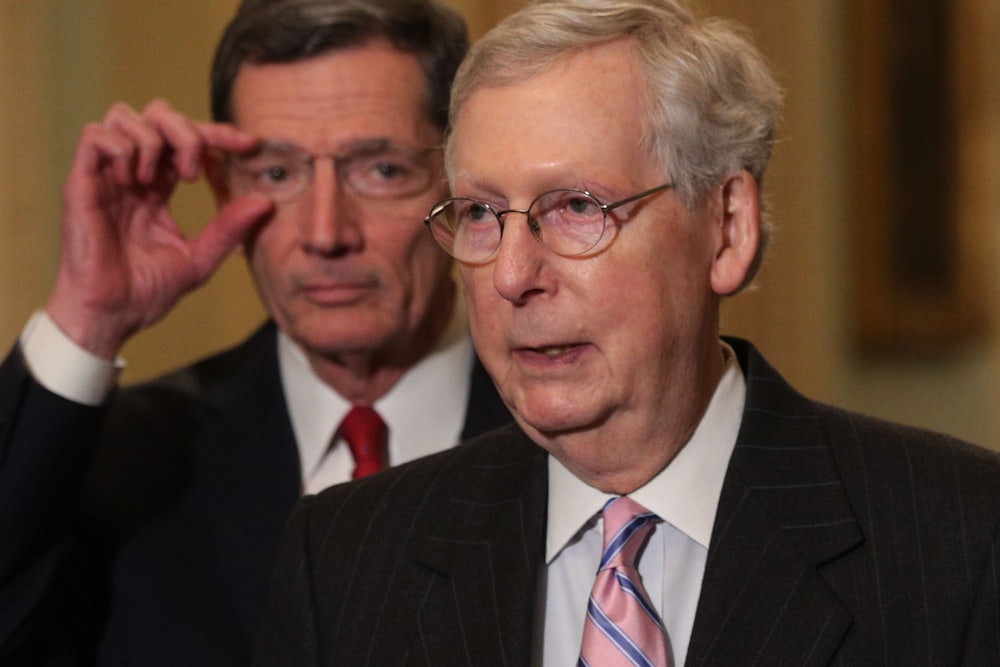When the Green New Deal started to gain steam with voters across the political spectrum last year, the Republicans faced a choice. They could counter Congresswoman Alexandria Ocasio-Cortez’s plan with one of their own, a free-market solution to the planet’s existential crisis. Or they could respond in the same way they’ve responded to every climate plan: by doubting the seriousness of global warming, or even denying its reality.
Some have suggested that the GOP is on the path to righteousness. The New York Times reported last month that Republican leaders who were once loud-mouthed science deniers are “now openly discussing climate change and proposing what they call conservative solutions.” Senate Environment Committee Chairman John Barrasso, in what the Times called “an important shift among Republicans in Congress,” said that “If we are serious about climate change, we must be serious about expanding our use of nuclear energy.” And Senator John Cornyn of Texas reportedly “is helping write legislation to reduce [greenhouse gas] emissions through ‘energy innovation.’”
Politico, too, has reported that Republicans are undergoing a “shift in perspective” when it comes to climate change. That shift was evidenced in part by Tennessee Senator Lamar Alexander, who proposed a 10-point plan to fight claim change, which he called a “new Manhattan Project for Clean Energy.”
I believe #climatechange is real. I believe that human emissions of greenhouse gases are a major cause of climate change. And, I’m proposing this response to climate change. pic.twitter.com/RzsQHhJfUn
— Sen. Lamar Alexander (@SenAlexander) March 25, 2019
Alexander, though, has always been an outlier in his party on this issue. In 2015, he was one of only two GOP senators to vote in favor of a non-binding resolution stating a simple fact: that climate change is real and caused by humans.
If that resolution were introduced again today, it would garner roughly the same level of support among Alexander’s peers. As even the Times acknowledged in its article last month, Republicans in Congress remain unwilling to speak honestly about the existential threat global warming poses to humanity and the natural world. “In almost all of the cases in which conservative politicians are cautiously staking out territory on climate change,” the report says, “they still do not acknowledge the extent of man’s responsibility for causing it.”
Meanwhile, the conservative politicians who are not cautiously staking out that territory—which is to say, most of them—continue to engage in theatrical denial:
Sen. Mike Lee, speaking on the Green New Deal and climate change: "Mr. President, this is the real solution to climate change: Babies." https://t.co/vFURvhHwka pic.twitter.com/xc3d3Tykme
— NBC News (@NBCNews) March 27, 2019
Republicans also still refuse to be realistic about the type of policies that will be needed to put a meaningful dent in greenhouse gas emissions. “Putting a price on emitting carbon into the atmosphere is verboten,” the Times reported. “And they insist solutions do not need to include eliminating or even curbing the use of oil, coal and other dirty energy sources primarily responsible for heating the planet.”
That last point is particularly important. How can voters trust a party that promises to solve a problem caused by fossil fuels, but without doing anything to slow the use of fossil fuels?
There is indeed a shift underway among Republicans on climate change, but it’s not toward good-faith solutions. It’s a shift from snowball-wielding climate denial to a more insidious version that relies on complicity and delay.
Most GOP politicians might not be willing to call climate change a Chinese hoax, but they’re fine if Trump continues to do it. They’re also fine with anything Trump does to worsen climate change—whether it be dismantling greenhouse gas regulations or refusing to sign an international accord stating warming is a problem in the Arctic. They’re fine with keeping quiet in the face of major scientific reports, like the one released Monday saying that 1 million species now risk going extinct due to human activity. No wonder the CO2 Coalition, a group that falsely argues that carbon dioxide is good for humans, is expanding its presence on Capitol Hill: It sees a receptive audience.
It’s not that good-faith Republicans don’t exist on climate change. They do, and they always have. But they’re not growing at any meaningful rate. A recent study on the potential for climate policy reform found that “the current actors in the conservative environmental movement are not strong enough to make serious inroads at a national level.” That’s partly because Republican donors aren’t interested in funding climate policy groups. “Given this macro-funding environment,” the report reads, “there is little hope that there will be a change in the funder community.”
There is thus little hope that the Republican Party as a whole will propose serious climate change solutions in the near or even distant future. Given that there’s little more than a decade left to implement those solutions, there’s no reason to wait for them. If the increasingly dire reports, or the issue’s rising prominence among young voters, aren’t enough to sway Republicans, what will be? It’s time to stop treating the Republican Party as a potential partner in solving the climate crisis, and start seeing it as the immovable obstacle it’s always been.
